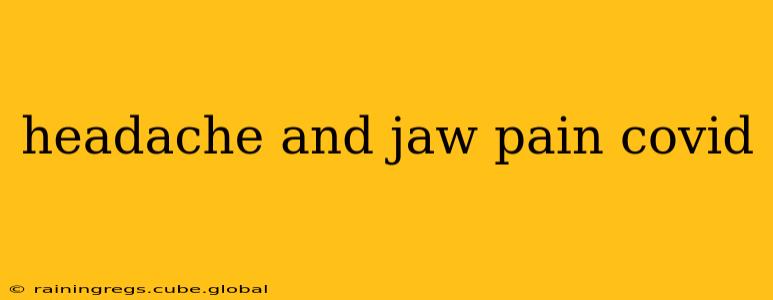Experiencing a headache and jaw pain? While these symptoms aren't exclusive to COVID-19, they can be associated with the virus, and it's crucial to understand the potential connection and when to seek medical attention. This comprehensive guide explores the link between headaches, jaw pain, and COVID-19, addressing common questions and concerns.
Can COVID-19 Cause Headaches and Jaw Pain?
Yes, headaches and jaw pain can be symptoms of COVID-19, although they aren't always present in every case. The virus's inflammatory response can affect various parts of the body, including the head and jaw muscles. The headache associated with COVID-19 can range from mild to severe and may present as a tension headache, migraine, or even a more unusual headache pattern. Jaw pain, in some cases, might be related to the tension headaches or possibly due to inflammation affecting the temporomandibular joint (TMJ), which connects your jaw to your skull.
What Other Symptoms Might Accompany COVID-19 Headaches and Jaw Pain?
While headaches and jaw pain alone don't confirm a COVID-19 infection, their presence alongside other symptoms significantly increases the likelihood. Common accompanying symptoms include:
- Fever: A high temperature is a frequent indicator of COVID-19.
- Cough: A persistent dry cough is another hallmark symptom.
- Fatigue: Extreme tiredness and exhaustion are common.
- Shortness of breath or difficulty breathing: This is a serious symptom requiring immediate medical attention.
- Muscle aches: Generalized body aches and pains are frequent.
- Loss of taste or smell: This is often cited as a key symptom, though not universally experienced.
- Sore throat: Inflammation of the throat can be present.
- Runny or stuffy nose: Similar to a common cold.
- Nausea or vomiting: Gastrointestinal symptoms can occur.
- Diarrhea: Another potential gastrointestinal symptom.
How Long Do COVID-19 Headaches and Jaw Pain Typically Last?
The duration of headaches and jaw pain associated with COVID-19 can vary significantly. Some individuals may experience these symptoms for only a few days, while others may have them for several weeks. The persistence and severity of these symptoms will depend on the individual's overall health and the severity of their COVID-19 infection.
Are Headaches and Jaw Pain Always a Sign of COVID-19?
No, headaches and jaw pain are not exclusive to COVID-19. Many other conditions can cause these symptoms, including:
- Tension headaches: Stress, poor posture, and muscle strain can trigger these.
- Migraines: These are severe headaches often accompanied by nausea and sensitivity to light and sound.
- Sinusitis: Inflammation of the sinuses can cause facial pain, including jaw pain.
- Temporomandibular joint (TMJ) disorders: Problems with the jaw joint can lead to jaw pain.
- Dental problems: Toothaches, gum infections, and other dental issues can cause jaw pain.
When Should I Seek Medical Attention for Headaches and Jaw Pain?
While many headaches and jaw pain episodes resolve on their own, it's crucial to seek medical attention if:
- Your symptoms are severe. Intense headaches, difficulty breathing, or significant jaw pain warrants immediate medical attention.
- Your symptoms worsen over time. If your symptoms escalate or don't improve, seek medical care.
- You have other concerning symptoms. The presence of other COVID-19 symptoms, such as fever, cough, or shortness of breath, necessitates medical evaluation.
- You're at high risk for severe COVID-19. Older adults or individuals with underlying health conditions should seek medical attention promptly.
Remember, this information is for general knowledge and doesn't constitute medical advice. Always consult a healthcare professional for diagnosis and treatment of any medical condition. They can assess your individual circumstances and provide appropriate care.
